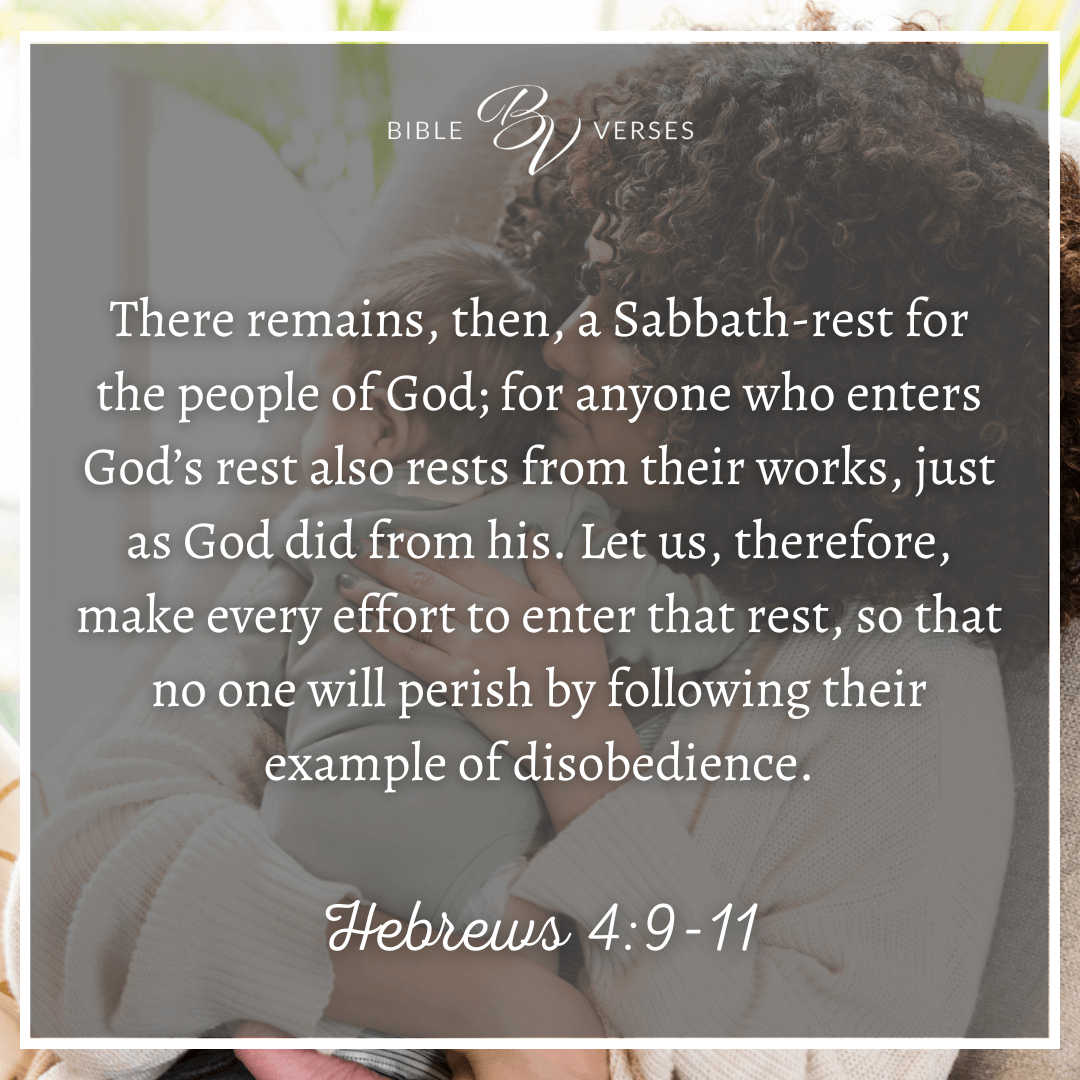15 Bible Verses That Invite You to Rest
In a world that constantly demands our attention and energy, finding true rest can seem like an elusive goal. The Bible, however, offers profound wisdom and encouragement on the subject of rest, providing us with timeless scriptures that promise peace, renewal, and comfort.
From the gentle invitation of Jesus for weary souls seeking reprieve, to the deep spiritual significance of Sabbath rest, these scriptures illuminate the importance of stepping back and finding solace in God’s presence.
In this blog post, we will explore various Bible verses about rest, uncovering their messages and discovering how they can guide us towards a deeper, more fulfilling experience of rest and renewal in our own lives.
Rest Quotes
Rest in the Bible
Exodus 20:8-10
Remember the sabbath day, to keep it holy.
Six days shalt thou labour, and do all thy work:
But the seventh day is the sabbath of the Lord thy God: in it thou shalt not do any work, thou, nor thy son, nor thy daughter, thy manservant, nor thy maidservant, nor thy cattle, nor thy stranger that is within thy gates:
Remember the Sabbath day by keeping it holy. Six days you shall labor and do all your work, but the seventh day is a sabbath to the Lord your God. On it you shall not do any work, neither you, nor your son or daughter, nor your male or female servant, nor your animals, nor any foreigner residing in your towns.
Remember to observe the Sabbath day by keeping it holy. You have six days each week for your ordinary work, but the seventh day is a Sabbath day of rest dedicated to the Lord your God. On that day no one in your household may do any work. This includes you, your sons and daughters, your male and female servants, your livestock, and any foreigners living among you.
Remember the Sabbath day, to keep it holy. Six days you shall labor, and do all your work, but the seventh day is a Sabbath to the Lord your God. On it you shall not do any work, you, or your son, or your daughter, your male servant, or your female servant, or your livestock, or the sojourner who is within your gates.

Exodus 20:8-10 is part of the Ten Commandments, which are laws given by God to the Israelites through Moses. These verses specifically address the Sabbath day and the importance of resting and dedicating it to the Lord.
These verses emphasize the importance of setting aside one day of the week, the Sabbath, as a day of rest and worship. It serves as a reminder of God’s creation work and His rest on the seventh day, as well as a way to ensure that everyone, including servants and even animals, gets a day of intentional rest.
Exodus 33:14
And he said, My presence shall go with thee, and I will give thee rest.
The Lord replied, “My Presence will go with you, and I will give you rest.”
The Lord replied, “I will personally go with you, Moses, and I will give you rest—everything will be fine for you.”
And he said, “My presence will go with you, and I will give you rest.”

In this scripture, God reassures Moses of His presence and guidance. This occurs during a conversation between God and Moses after the incident of the golden calf, where the Israelites had sinned by worshiping an idol. Moses is interceding for the people, seeking assurance that God will continue to lead them to the Promised Land despite their disobedience.
God responds to Moses by promising that His presence will go with the Israelites and that He will give them rest. This reassurance is crucial because it affirms God’s commitment to His people and His willingness to continue guiding and providing for them despite their failings. The promise of rest signifies not only physical rest from their journey but also spiritual peace and security in God’s care.
1 Kings 5:4
But now the Lord my God hath given me rest on every side, so that there is neither adversary nor evil occurrent.
But now the Lord my God has given me rest on every side, and there is no adversary or disaster.
But now the Lord my God has given me peace on every side; I have no enemies, and all is well.
But now the Lord my God has given me rest on every side. There is neither adversary nor misfortune.

1 Kings 5:4 is part of a passage where King Solomon speaks about the peace and stability that God has granted him, enabling him to focus on building the temple. This verse highlights the period of rest and security that Solomon experiences, which contrasts with the earlier conflicts and struggles faced by his father, King David.
Here’s a little bit of context: Solomon is addressing King Hiram of Tyre, explaining why he is now able to undertake the significant task of building a temple for the Lord. David, Solomon’s father, had wanted to build the temple but was unable due to the wars and conflicts during his reign. Solomon points out that God has now given him peace on every side, making it possible to focus on this important spiritual and national project.
Significance:
- Rest and Peace: The verse emphasizes the divine blessing of peace and rest from enemies, allowing for the construction of the temple.
- Divine Provision: It underscores God’s role in providing the necessary conditions for significant undertakings.
- Solomon’s Reign: It highlights a period of prosperity and stability during Solomon’s reign, marking it as a time of fulfillment and divine favor.
Overall, 1 Kings 5:4 underscores the importance of divine peace and stability as foundational for achieving great tasks, such as building the temple, which was central to Israel’s worship and national identity.
Job 11:18
And thou shalt be secure, because there is hope; yea, thou shalt dig about thee, and thou shalt take thy rest in safety.
You will be secure, because there is hope; you will look about you and take your rest in safety.
Having hope will give you courage. You will be protected and will rest in safety.
And you will feel secure, because there is hope; you will look around and take your rest in security.

In this context, Zophar is offering Job reassurance that repentance will lead to a sense of security and a hopeful future. He envisions a life where Job can look around confidently, finding peace and protection, symbolized by the ability to rest safely.
For Zophar, this rest is contingent upon Job’s repentance and renewed relationship with God, highlighting the belief that spiritual alignment with God’s will results in inner peace and external security.
However, the Book of Job as a whole later reveals that Zophar’s understanding is limited. Job’s suffering is not due to hidden sin but serves a greater, more complex purpose. (Much of Job is often taken out of context, so be sure to read the book in entirety!) Despite this, even in Zophar’s shortcomings, the concept of rest in this verse underscores the profound human need for spiritual and emotional security, which is ultimately found in trust and faith in God’s wisdom and care.
Psalm 3:5
I laid me down and slept; I awaked; for the Lord sustained me.
I lie down and sleep; I wake again, because the Lord sustains me.
I lay down and slept, yet I woke up in safety, for the Lord was watching over me.
I lay down and slept; I woke again, for the Lord sustained me.

Psalm 3:5 expresses a profound sense of trust and reliance on God amidst adversity. In the context of the psalm, King David is facing a serious threat from his enemies and is deeply troubled. Despite this, he finds peace and security in God.
The verse reflects David’s ability to rest and sleep peacefully even in the midst of his struggles. His rest symbolizes a deep confidence in God’s protection and support. By stating that he “lay down and slept” and “woke again,” David acknowledges that his rest is not merely physical but a result of spiritual assurance. He attributes his safety and ability to wake up to the Lord’s sustaining power.
Psalm 4:8
I will both lay me down in peace, and sleep: for thou, Lord, only makest me dwell in safety.
In peace I will lie down and sleep, for you alone, Lord, make me dwell in safety.
In peace I will lie down and sleep, for you alone, O Lord, will keep me safe.
In peace I will both lie down and sleep; for you alone, O Lord, make me dwell in safety.

Again in Psalm 4:8, David expresses a profound sense of peace and trust in God. David speaks of his confidence in God’s protection, which allows him to sleep peacefully. Despite any fears or troubles he might face, he is assured that God alone is the source of his security and safety.
Psalm 37:7
Rest in the Lord, and wait patiently for him: fret not thyself because of him who prospereth in his way, because of the man who bringeth wicked devices to pass.
Be still before the Lord and wait patiently for him; do not fret when people succeed in their ways, when they carry out their wicked schemes.
Be still in the presence of the Lord, and wait patiently for him to act. Don’t worry about evil people who prosper or fret about their wicked schemes.
Be still before the Lord and wait patiently for him; fret not yourself over the one who prospers in his way, over the man who carries out evil devices.

This verse offers guidance on maintaining faith and patience in the face of adversity and injustice. It encourages believers to remain calm and trust in the Lord rather than being troubled by the apparent success of the wicked or those who seem to prosper through unjust means.
The call to “rest in the Lord” implies a deep, inner peace and trust in God’s sovereignty and timing. It means to be still and not be overwhelmed by anxiety or envy of others. This rest involves a spiritual and emotional calmness, rooted in the confidence that God will ultimately address injustice and uphold righteousness.
Rest, in this context, is about finding peace in God’s presence and surrendering one’s worries and frustrations about life’s inequalities and the prosperity of the wicked. It’s an invitation to trust that God is in control and to wait patiently for His justice and intervention, rather than being consumed by fretfulness or agitation.
Psalm 46:10
Be still, and know that I am God: I will be exalted among the heathen, I will be exalted in the earth.
“Be still, and know that I am God; I will be exalted among the nations, I will be exalted in the earth.”
“Be still, and know that I am God! I will be honored by every nation. I will be honored throughout the world.”
“Be still, and know that I am God. I will be exalted among the nations, I will be exalted in the earth!”

In this context, “Be still” signifies a deliberate act of pausing and finding tranquility in the awareness of God’s power and control. It’s about letting go of our own efforts and worries, allowing ourselves to be at peace in the assurance that God is in control and will be exalted in all circumstances.
By being still and knowing that God is God, individuals can find a profound sense of rest and security, knowing that His purposes will prevail, and His presence will be made known throughout the world. This rest is an invitation to experience peace and trust in God’s sovereign plan.
Psalm 62:1-2
Truly my soul waiteth upon God: from him cometh my salvation. He only is my rock and my salvation; he is my defense; I shall not be greatly moved.
Truly my soul finds rest in God; my salvation comes from him. Truly he is my rock and my salvation; he is my fortress, I will never be shaken.
I wait quietly before God, for my victory comes from him. He alone is my rock and my salvation, my fortress where I will never be shaken.
For God alone my soul waits in silence; from him comes my salvation. He alone is my rock and my salvation, my fortress; I shall not be greatly shaken.

In this scripture, the psalmist speaks of waiting quietly and finding rest in God alone, recognizing Him as the ultimate source of salvation and protection.
The psalmist’s declaration that he will not be “greatly moved” or “shaken” underscores a deep confidence in God’s unchanging nature and steadfast support. This rest represents a complete surrender of anxiety and fear, knowing that God’s strength and protection are unwavering.
Isaiah 30:15
For thus saith the Lord GOD, the Holy One of Israel; In returning and rest shall ye be saved; in quietness and in confidence shall be your strength: and ye would not.
This is what the Sovereign Lord, the Holy One of Israel, says: “In repentance and rest is your salvation, in quietness and trust is your strength, but you would have none of it.”
This is what the Sovereign Lord, the Holy One of Israel, says: “Only in returning to me and resting in me will you be saved. In quietness and confidence is your strength. But you would have none of it.”
For thus said the Lord GOD, the Holy One of Israel: “In returning and rest you shall be saved; in quietness and trust shall be your strength. But you were unwilling.”

Isaiah 30:15 conveys a message from God to the people of Israel, emphasizing the path to salvation and strength through repentance and trust in Him. God, speaking through the prophet Isaiah, outlines that salvation and strength come from returning to Him and finding rest in His presence. The verse highlights the importance of quietness and trust as key components of spiritual strength.
In this context, the people of Israel are being urged to turn back from their reliance on foreign alliances and other forms of self-reliance that are seen as misguided. Instead, they are called to trust in God’s provision and protection. The verse contrasts this divine path with the people’s reluctance to accept it, revealing their stubbornness and unwillingness to embrace God’s offer of peace and security.
The significance of rest in this verse is profound. It represents not just physical relaxation but a deep spiritual peace that comes from trusting in God’s plans and yielding to His will. Rest and quietness are symbols of a surrendered heart that finds security and salvation in God alone. Despite God’s offer of comfort and strength, the verse concludes with a lament over the people’s refusal to embrace this divine guidance.
Jeremiah 31:25
For I have satiated the weary soul, and I have replenished every sorrowful soul.
I will refresh the weary and satisfy the faint.
I will refresh the weary and satisfy the faint.
I will satisfy the weary soul, and every languishing soul I will replenish.

In Jeremiah 31:25, God promises to bring relief and restoration to those who are weary and burdened. In this passage, God assures the people of Israel that He will provide for their needs, both physically and emotionally.
The scripture reflects God’s commitment to addressing the deep exhaustion and distress experienced by His people. By stating that He will “refresh the weary” and “satisfy the faint,” the promise speaks to a divine intervention that offers true rest and restoration.
Matthew 11:28
Come unto me, all ye that labour and are heavy laden, and I will give you rest.
“Come to me, all you who are weary and burdened, and I will give you rest.”
Then Jesus said, “Come to me, all of you who are weary and carry heavy burdens, and I will give you rest.’”
“Come to me, all who labor and are heavy laden, and I will give you rest.”

One of the more popular bible verses about rest, Matthew 11:28 is a comforting invitation from Jesus to those who are struggling and burdened. In this verse, Jesus extends a call to anyone who feels weary and overwhelmed by life’s challenges. He promises rest to those who come to Him, offering relief from the weight of their troubles.
This rest is not just a physical reprieve but a deeper, spiritual peace that comes from being in a relationship with Jesus. It signifies relief from the burdens of sin, guilt, and the pressures of life. Jesus’ invitation is meant to provide solace and renewal.
Mark 2:27
And he said unto them, The sabbath was made for man, and not man for the sabbath.
Then he said to them, “The Sabbath was made for man, not man for the Sabbath.“
Then Jesus said to them, “The Sabbath was made to meet the needs of people, and not people to meet the requirements of the Sabbath.”
And he said to them, “The Sabbath was made for man, not man for the Sabbath.”

Mark 2:27 addresses the purpose and nature of the Sabbath, as stated by Jesus. The verse reflects a critical teaching from Jesus in response to criticism from religious leaders about His disciples’ actions on the Sabbath.
In this passage, Jesus explains that the Sabbath was intended to serve humanity’s needs rather than to impose burdensome requirements on the people. The Sabbath, according to Jesus, was created for human benefit—to provide rest, renewal, and a break from the daily grind of work. It is meant to be a time for people to experience restoration and to reconnect with God.
The emphasis on rest in this context underscores that the Sabbath’s purpose is to offer relief and rejuvenation, not to become a source of legalistic oppression. By stating that “the Sabbath was made for man,” Jesus highlights that the day of rest is a gift meant to benefit people, helping them to find physical, emotional, and spiritual refreshment. This teaching reorients the understanding of the Sabbath from rigid rules to a focus on its restorative purpose and human well-being.
Mark 6:31
And he said unto them, Come ye yourselves apart into a desert place, and rest a while: for there were many coming and going, and they had no leisure so much as to eat.
Then, because so many people were coming and going that they did not even have a chance to eat, he said to them, “Come with me by yourselves to a quiet place and get some rest.”
Then Jesus said, “Let’s go off by ourselves to a quiet place and rest awhile.” He said this because there were so many people coming and going that Jesus and his apostles didn’t even have time to eat.
And he said to them, “Come away by yourselves to a desolate place and rest a while.” For many were coming and going, and they had no leisure even to eat.

Mark 6:31 captures a moment when Jesus recognizes the exhaustion of His disciples due to their busy ministry schedule. They had been so overwhelmed with people coming and going that they hadn’t even had time to eat. In response, Jesus invites them to retreat to a quiet, desolate place to rest and rejuvenate.
The verse emphasizes the importance of rest and recuperation, even for those engaged in ministry and service. Jesus’ instruction to “come away by yourselves to a desolate place and rest a while” reflects a compassionate understanding of human needs. It highlights several key lessons about rest:
- Human Needs for Rest: Jesus acknowledges that rest is essential for physical and mental well-being. Even those who are dedicated to serving others need time to recharge and take care of themselves.
- Intentional Rest: The invitation to a “quiet place” underscores the need for intentional and purposeful rest. It’s not just about taking a break but about finding a space away from the demands and distractions of daily life to recover and regain strength.
- Balance in Service: The context shows that even in the midst of significant and urgent work, it’s vital to maintain a balance. Proper rest helps maintain effectiveness and prevents burnout.
In summary, Mark 6:31 teaches that rest is a necessary and integral part of sustaining one’s ability to serve and function effectively. It encourages us to recognize the value of taking breaks and seeking quiet moments to restore our energy and focus.
Hebrews 4:9-11
There remaineth therefore a rest to the people of God. For he that is entered into his rest, he also hath ceased from his own works, as God did from his. Let us labour therefore to enter into that rest, lest any man fall after the same example of unbelief.
There remains, then, a Sabbath-rest for the people of God; for anyone who enters God’s rest also rests from their works, just as God did from his. Let us, therefore, make every effort to enter that rest, so that no one will perish by following their example of disobedience.
So there is a special rest still waiting for the people of God. For all who have entered into God’s rest have rested from their labors, just as God rested from creating the world. So let us do our best to enter that rest. But if we disobey God, as the people of Israel did, we will fall.
So then, there remains a Sabbath rest for the people of God, for whoever has entered God’s rest has also rested from his works as God did from his. Let us therefore strive to enter that rest, so that no one may fall by the same sort of disobedience.

Wrapping up bible verses about rest, Hebrews 4:9-11 discusses the concept of “rest” in the context of spiritual fulfillment and salvation. The passage emphasizes that a special kind of rest remains available for the people of God, which is likened to a Sabbath rest.
The passage connects this rest to the completion of God’s work, as He rested on the seventh day after creation. Similarly, those who enter God’s rest cease from their own works, finding peace and fulfillment in God’s provision and grace. This rest represents the ultimate goal of faith and obedience—a place of spiritual tranquility and relationship with God.
The author of Hebrews urges believers to make every effort to enter this rest. The warning is against the disobedience and unbelief that caused the Israelites to miss out on their promised rest. By striving to enter this rest, believers are called to align their lives with God’s promises and avoid falling into the same patterns of disobedience.
Overall, the passage underscores that spiritual rest is a gift from God, achieved through faith and obedience, and is essential for experiencing the fullness of life that God offers.










